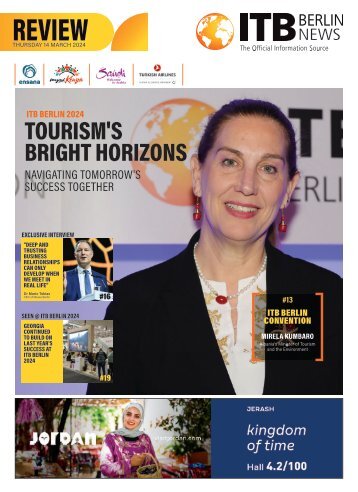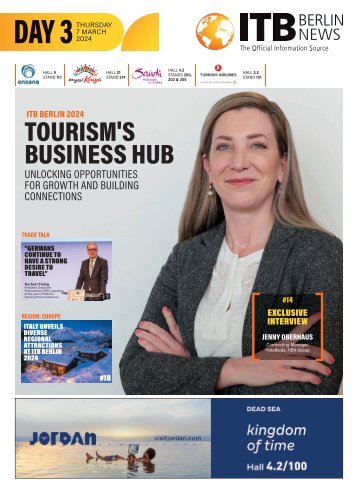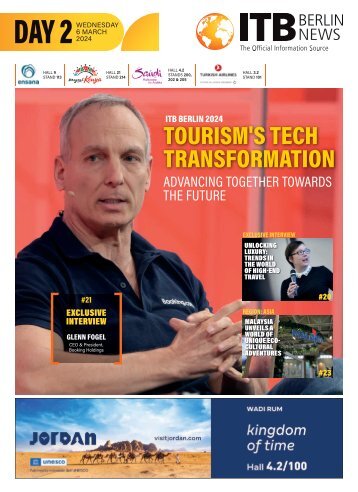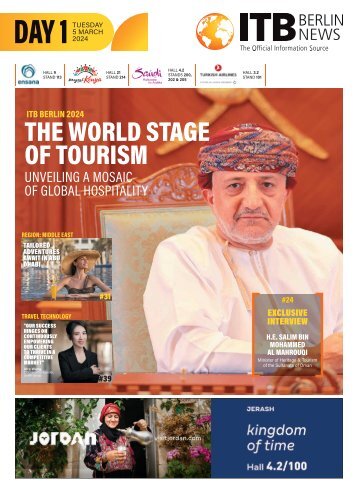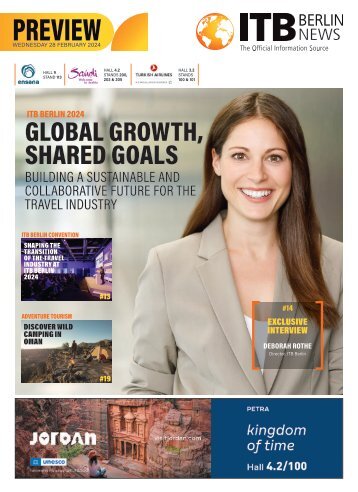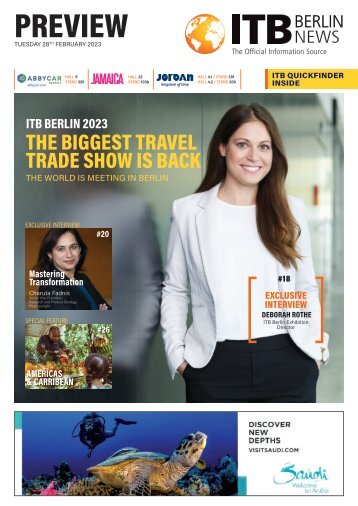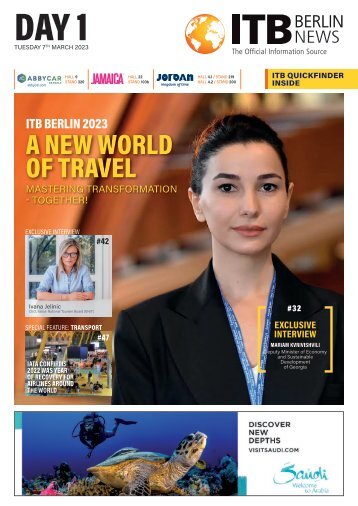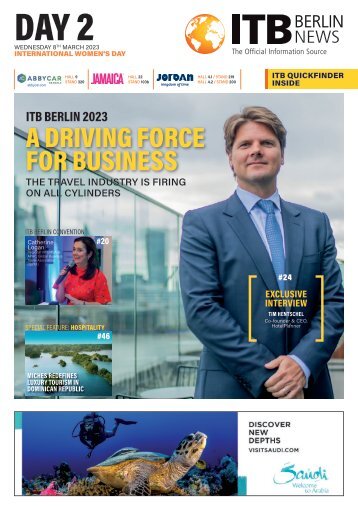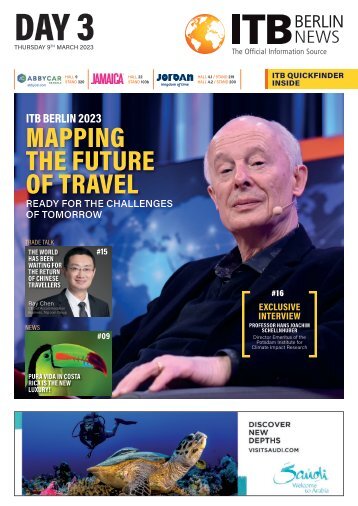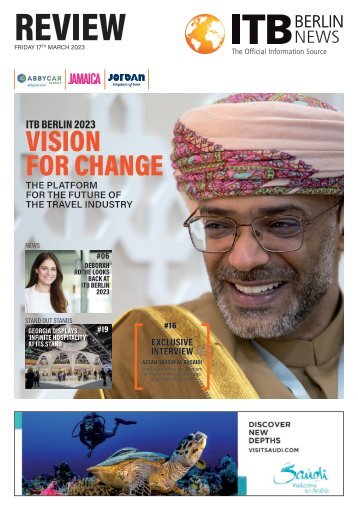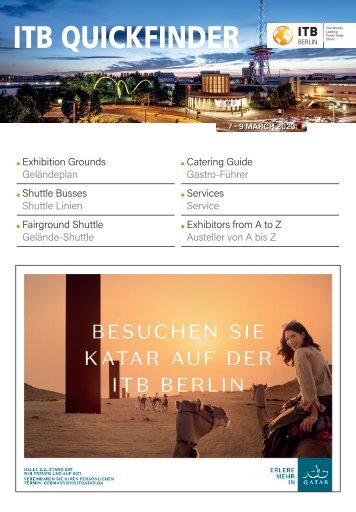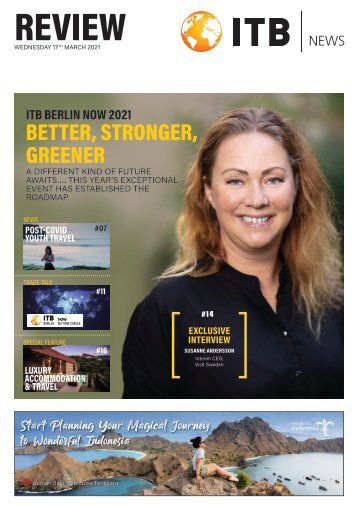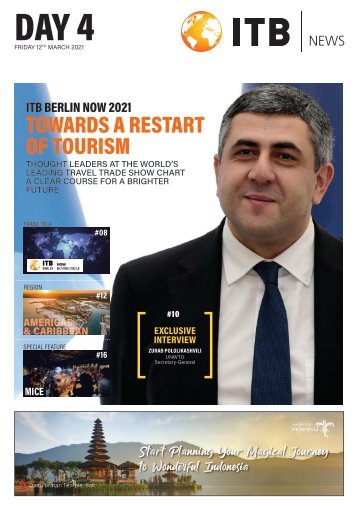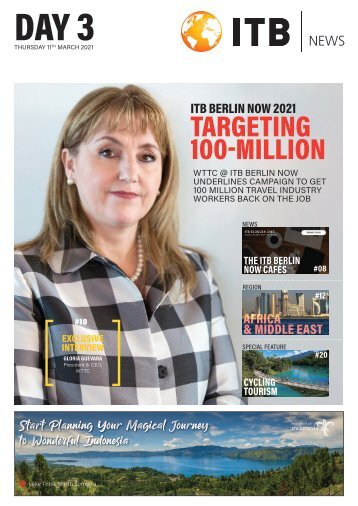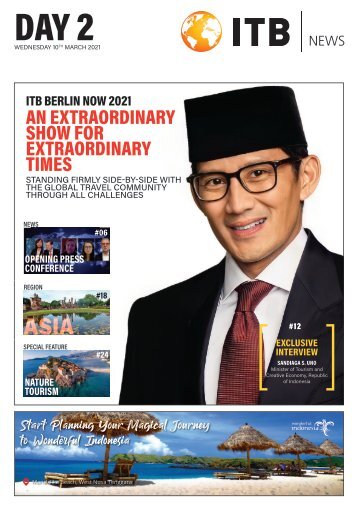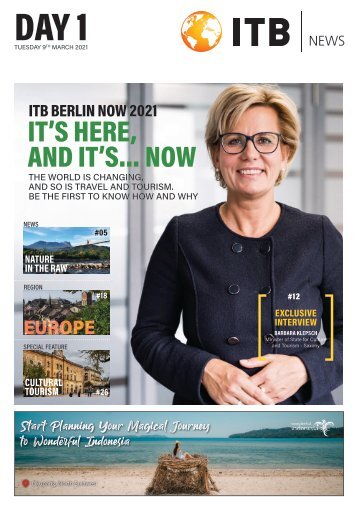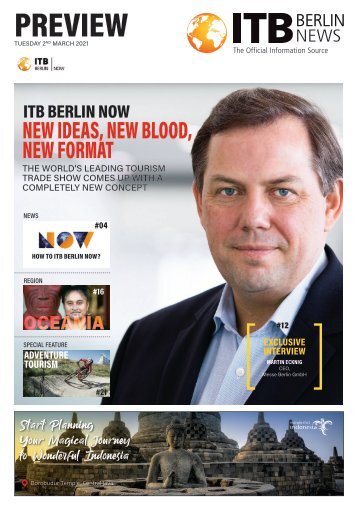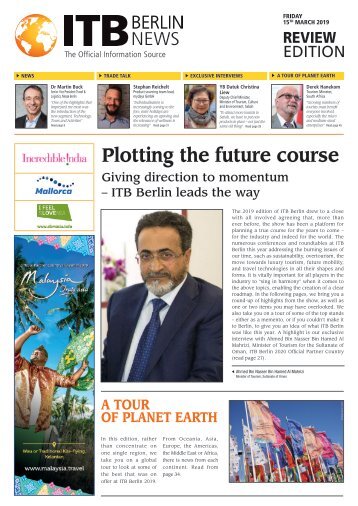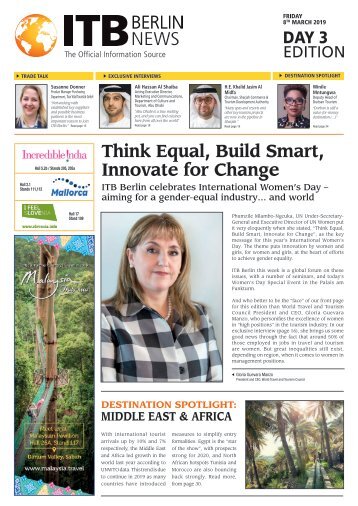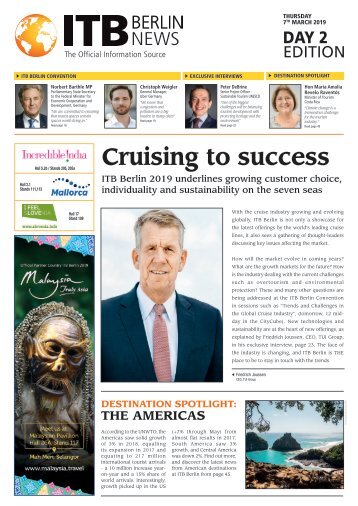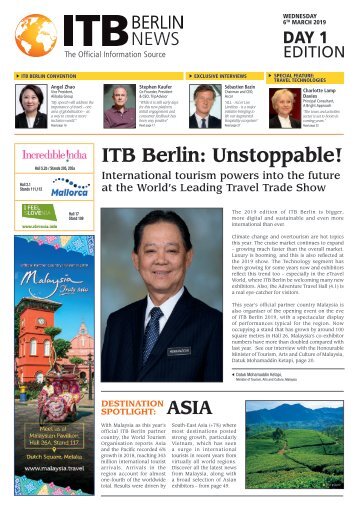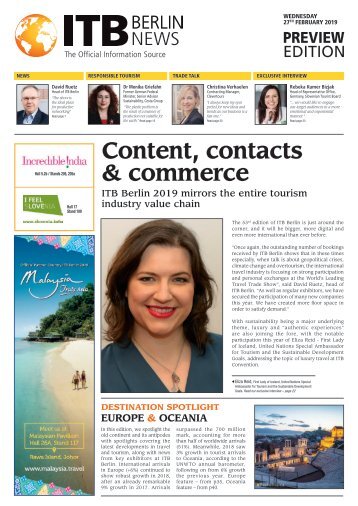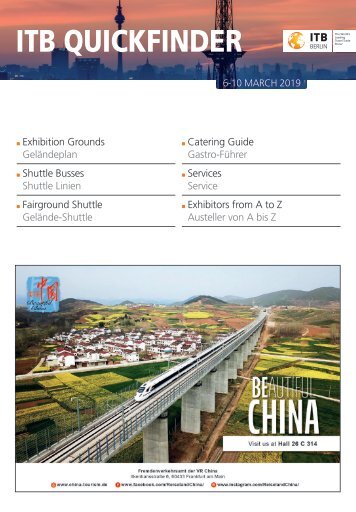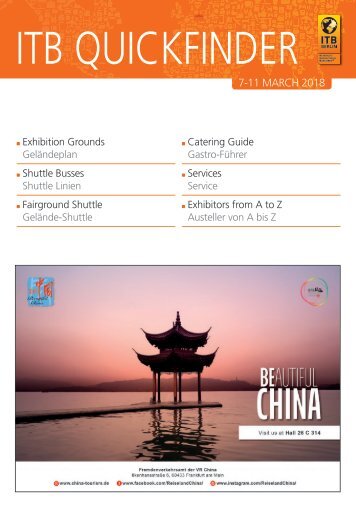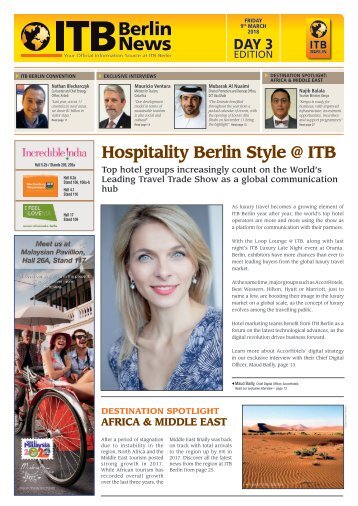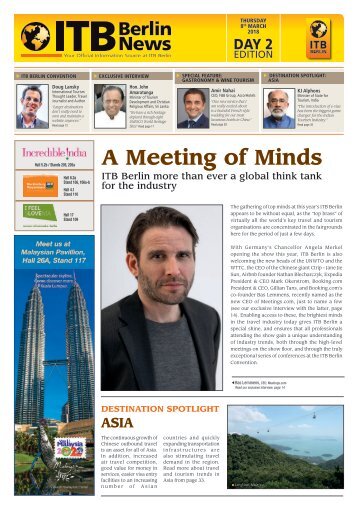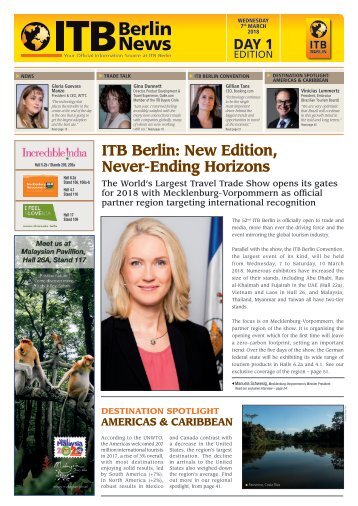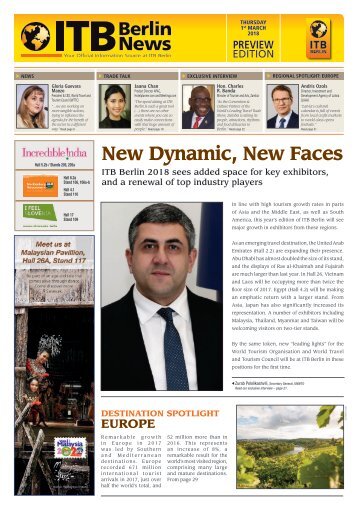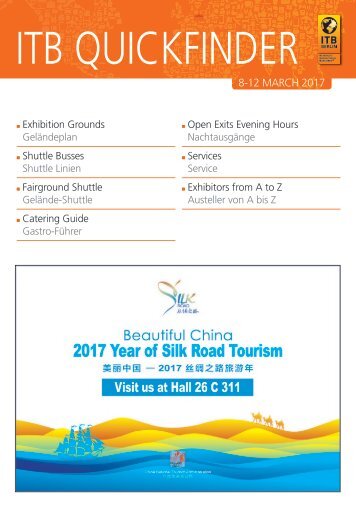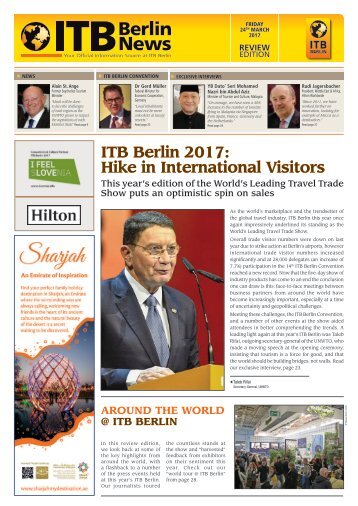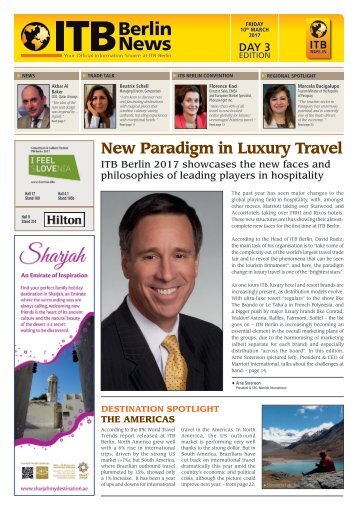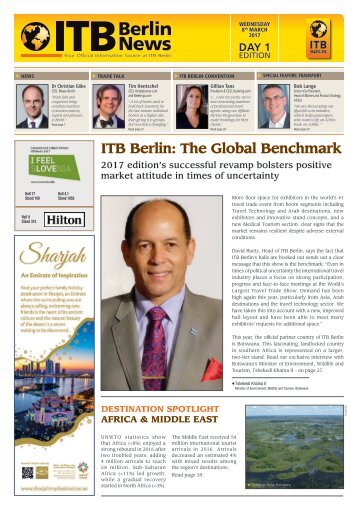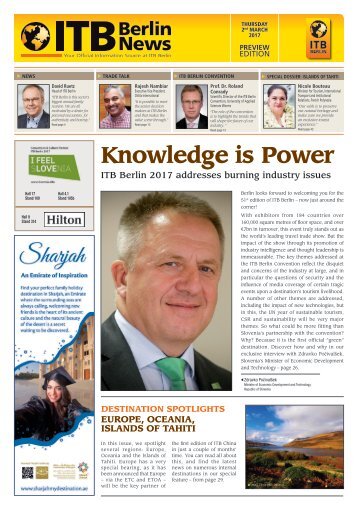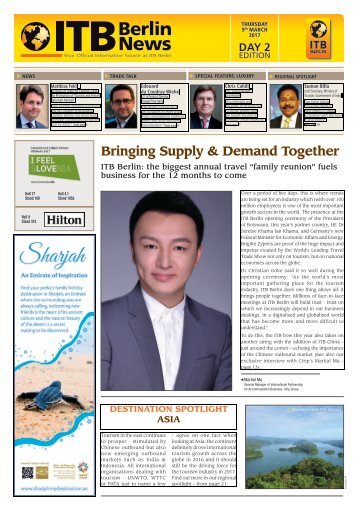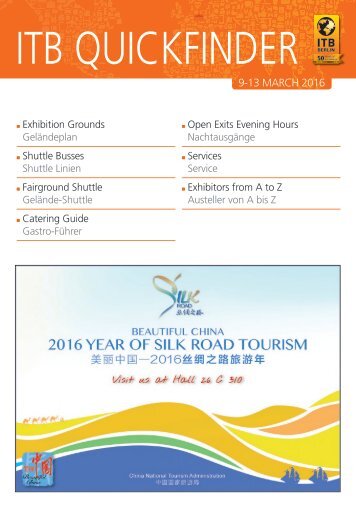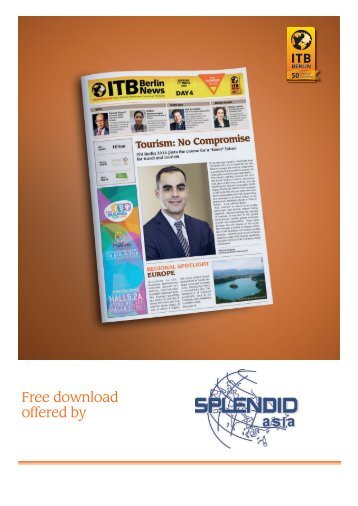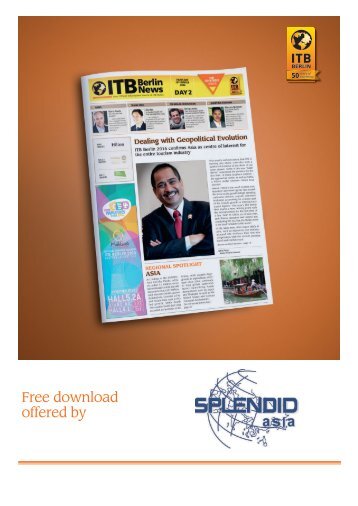
ITB Berlin News - Day 2
- Text
- Tourism
- Berlin
- Destinations
- Maldives
- Hotels
- Luxury
- Destination
- Global
- Arrivals
- Tourists
10 ITB
10 ITB BERLIN CONVENTION Yan Han WTCF Deputy Secretary-General Pr Wilhelm Bauer Director, Fraunhofer Institute for Industrial Engineering IAO GREETING FROM THE CO-HOST WTCF Category: ITB Future Day DESTINATION SECURITY: STATUS QUO AND THE FUTURE OF SECURITY POLICY AND TECHNOLOGY Category: ITB Destination Day 2 Date: March 9, 2017 Time: 10:45 a.m. - 11:45 a.m. Location: Hall 7.1a, Auditorium New York 1 WTCF Founder Yan Han Advocates ‘Better City Life Through Tourism’ Addressing the ITB Berlin Convention opening day, the WTCF Deputy Secretary- General presented valuable tourism data As co-host of ITB Berlin 2017, the World Tourism Cities Federation (WTCF) has a significant presence this year, not least the involvement of Yan Han, Deputy Secretary-General, WTCF, as a key speaker on March 8. Yan explained to ITB Berlin News the origins and objectives of WTCF. Destination Safety and Security Professor Wilhelm Bauer’s scientific approach to making tourism as safe as possible Delivering a keynote session entitled ‘Destination Safety & Security: Status Quo And The Future Of Security Policy And Technology’ at ITB Berlin, Thursday, Prof. Wilhelm Bauer (Director, Fraunhofer Institute for Industrial Engineering and Organisation IAO) addresses the strategies and technical measures required to ensure safe travel. Speaking to ITB Berlin News, Prof. Bauer explained what is being done technically to reduce risks for tourists: WTCF is an international tourism organization formed by wellknown tourism cities and related institutions around the world under the initiative of Beijing, where it is also based. WTCF offers its 181 members services including exhibition activities, publicity, themed discussions, consulting, industry training, tourism programme investment and financing. Among WTCF’s 120 city members, 43 of them are located in Europe; so ITB Berlin is an important platform. You bring extensive research to ITB Berlin 2017 – can you give us a summary of your findings? The reports show that in 2016, global tourism has become a vital drive for global economy. For the first time, global tourist arrivals in 2016 passed the 10 billion mark, reaching a total 10.5 billion up by 4.8 % over last year. Global tourism revenue reached .17trillion which amounts to 7.0% of the global GDP - a 3.6% rise since last year. Several key findings include: that global tourism economy grew faster than the global economy; that tourism played a significant role in rebalancing the global economy; and that cities became the pivots of the world tourism economy. As well as full detail on your comprehensive research, what else did attendees learn from your presentation? With a focus on Chinese o u t b o u n d t o u r i s m , w e demonstrated how WTCF provides We-media service to members through its WeChat, official Weibo, official website, magazine, newsletter, and APP. Combined, these have the potential to reach about 2 million tourists and most of fundamental services are offered by free New technologies and organizational concepts in security will increase in tourism. Prevention of damage against tourists and tourist infrastructures by observation and access systems will increase. High efforts will be spent on IT-security, and private security companies with competent and qualified staff are in high demand. Ultimately it is crucial to balance out the use of technologies and organizational concepts with the behaviour of individuals on holidays and the necessary implementation of efforts by tourist installations. So, the major challenge in the tourism sector is to identify the right security solutions, bring them in accordance to their customers’ needs and implement the solution in an appropriate and manageable way. Please tell us a little bit about your work in this field. A key challenge for Fraunhofer Institute for Industrial Engineering in this context is to shape the interaction between humans, technology and organization in tourism and security. So branchoriented activities like ‘future hotel’ as well as security solutions in tourism like IT-security for hotels, competences, skills and qualifications for security management are some of the activities driven by our institute. Together with ITB Berlin and the University Of Worms, we help companies and institutions to recognize and use the potential of new technologies and organizational concepts to make their business a success. What should destinations be doing to improve security? Today, security issues are a core challenge for tourism destinations striving to maintain a positive experience for visitors. New technologies to prevent cyberattacks, technology-based situational awareness and position detection as well as skills and competences to use these technologies in order to prevent security issues are key challenges for destinations nowadays ITB BERLIN NEWS • Thursday 9 th March 2017 www.itb-berlin-news.com
ITB BERLIN CONVENTION 11 Dr Lászlò Puszko Director of Industry Intelligence, Resources of Leisure Assets Lynn Curry CMC, President & Co-Owner, RLA USA LLC CROSS-OVER BETWEEN WELLNESS AND MEDICAL SERVICES: IS LIFESTYLE MEDICINE THE NEW WELLNESS? Category: ITB Experts Forum Wellness Date: March 9, 2017 Time: 10:40 a.m. - 11:10 a.m. Location: Hall 7.3a, Auditorium Berlin 1 DESIGN FOR WELLBEING AND FOR THE ROI IN YOUR HOSPITALITY DEVELOPMENT Category: ITB Experts Forum Wellness Date: March 9, 2017 Time: 1:15 p.m. - 1:55 p.m. Location: H all 7.3a, Auditorium Berlin 1 Wellness & Spa Travel: Sprechen Sie German? Designing Wellbeing Spas For Competitive Advantage At this year’s ITB Berlin Convention, Dr Lászlò Puszko, Director of Industry Intelligence, Resources for Leisure Assets, takes a closer look at just what it takes to attract German speaking clientele to spa and wellness resorts. We asked him to tell us more about this market. The current German speaking market is rather developed and mature. For them, looking after one’s health is not new, but is more like the expected lifestyle choice for several segments. Therefore, these people look for similar (healthy or vital) services during their travel as well. When wellness or spa services and treatments are rooted deeply in the lifestyle and leisure habits, there is no surprise that they are attracted to themed facilities (thermal baths etc), destinations (specialised for medical services or for wellness), either in the mountains or by the sea or lakes. How do German guests differ from those of other countries when they go to spas? Typically, German speaking travellers looking for spa and/ or wellness services during their international travels can represent different demands. Being experienced in a wide variety of services, they seek similar or better quality and variety. Aufgüsse (pouring water over heated rocks) may not be available in many foreign destinations, and especially not the FKK (nude bathing) provision. IWSTM 2017 shows that German travellers are more “mid” than upmarket, and data also indicate that German travellers are younger than average. Services based on local and natural assets and resources are more important to German wellness travellers than others. What should those managing hotel/spas around the world do to better welcome guests from this country? Operators have to understand that they are serving a market who are experienced wellness travellers and spa users. They should not forget that German wellness guests can spend around 190% of the average spend, which comes with expectations in variety and quality of services Spas and wellbeing facilities are growing in popularity, but ensuring their ROI is another matter. At the ITB Convention this week, Lynn Curry, CMC, President & Co-Owner, RLA USA LLC, will be covering some of the key factors that need to be taken into account. We asked her to tell us a little more. Any spa or wellbeing facility must consider its location, market mix and competition. In many cases, especially at mature markets, the initial concept and the value transaction to guests may precede any other consideration. Building the spa, the right size for the location, will require a proper feasibility study that identifies guest use calculations, volume, average check, and components for competitive advantage. Proper study will also provide the information on whether to have a spa in the first place, or to replace with other wellbeing opportunities on the property for TrevPar, not just RevPar. Do you have any case examples? A spa facility in an urban hotel has a different type of guest use than a wellbeing facility in a resort. Urban hotels may attract a wellbeing guest who is on a business trip with limited time to rejuvenate, thus design is with less space in both availability and need. A spa in a resort, especially if the resort is within an area that could attract the local spa goer, may draw guests who stay for a day, which results in TrevPar for the property, even without guest room revenue, because of the additional F&B and retail revenues. These facilities also entice day users to bring friends for a social programming, if additional relaxation space exists. For example, we are currently developing The Four Seasons Napa Valley, with a spa garden and thermal pool, and we designed Island Spa Catalina, open since 2014) with an oversized relaxation deck overlooking Avalon Harbor and the Pacific. Both with high end F&B, retail, and gift certificate sales opportunities ITB BERLIN NEWS • Thursday 9 th March 2017
- Page 1: THURSDAY 9 th MARCH 2017 DAY 2 EDIT
- Page 4: 4 NEWS France Remains The Most Popu
- Page 7 and 8: NEWS 7 World Travel Monitor Reveals
- Page 9: TRADE TALK 9 Hopping Around the Pla
- Page 15: SPECIAL FEATURE LUXURY ACCOMMODATIO
- Page 18 and 19: 18 SPECIAL FEATURE LUXURY ACCOMMODA
- Page 20 and 21: 20 SPECIAL FEATURE MEDICAL TOURISM
- Page 23 and 24: ASIA REGION 23 John Amaratunga Mini
- Page 25: ASIA REGION 25 Targeting Malaysia
- Page 28 and 29: 28 REGION ASIA China Southern Airli
- Page 31: ASIA REGION 31 HE Mr Ohn Maung Unio
- Page 34 and 35: 34 SPECIAL DOSSIER: MALDIVES (Desti
- Page 36 and 37: 36 SPOTLIGHT ON GERMAN REGION: NORT
- Page 38: 38 WHERE TO GO IN Berlin Restaurant
Inappropriate
Loading...
Mail this publication
Loading...
Embed
Loading...
